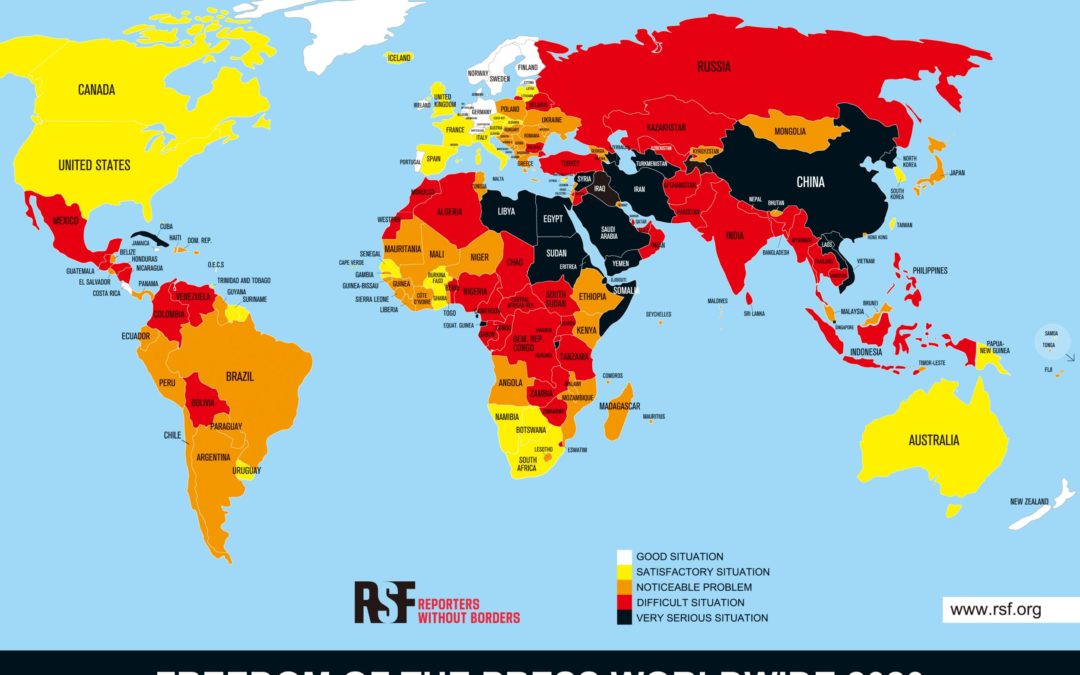Poland has fallen to 62nd out of 180 countries in the World Press Freedom Index compiled annually by Reporters Without Borders (RSF), a leading Paris-based NGO that seeks to promote and defend independent journalism and access to information. It classifies Poland as among the counties that have “a noticeable problem” with press freedom.
This is the fifth year in a row that Poland has recorded a decline in the ranking, all of which have taken place under the current Law and Justice (PiS) government that came to power in late 2015. In that year, Poland had reached a record high of 18th in the index. Now, five years later, it finds itself below Armenia (61st), Niger (57th) and Papua New Guinea (46th).
Nordic countries top the rankings, with Norway, Finland, Denmark and Sweden occupying the first four places respectively, followed by the Netherlands in fifth. The United States ranks only 45th, while Germany is 11th and the United Kingdom 35th. Russia (149th) and China (177th) find themselves near the foot of the index.
#RSFIndex ¦ RSF unveils its 2020 World Press Freedom Index:
1: Norway??
2: Finland??
3: Denmark??
11: Germany??
34: France??
35: United Kingdom??
45: United States??
66: Japan??
107: Brazil??
142: India??
166: Egypt??
178: Eritrea??
180: North Korea??https://t.co/4izhhdhZAo pic.twitter.com/biJfunlTSw— RSF (@RSF_inter) April 21, 2020
In its country report for Poland, RSF begins by writing that “the government’s drive to subjugate the judicial system and a growing tendency to criminalize defamation are beginning to have an effect on the freedom of expression of independent media outlets”.
As an example, it notes that Gazeta Wyborcza, a newspaper critical of the government, “continues to be the leading target of government lawsuits”. In December, the International Press Institute also condemned the “legal harassment” of the newspaper, noting that around 50 criminal and civil cases have been brought against it by state or state-controlled entities.
Last year, PiS leader Jarosław Kaczyński personally sued the newspaper for publishing secret recordings of a negotiation between him and an Austrian businessman. He claims that Gazeta Wyborcza falsely suggested he had committed crimes. The case is ongoing.
RSF’s concerns echo those of the OSCE, an intergovernmental organisation, which warned last year in a report on Poland’s parliamentary elections that “freedoms of expression and the media are undermined by criminal penalties for defamation”.
The ruling party has pursued a radical overhaul of the judiciary, which various international institutions have condemned as seeking to bring courts under political control. PiS has also been eager to make use of Poland’s wide array of “insult laws”, which the OSCE notes are among the most comprehensive and severe in the democratic world.
In its report, RSF also notes that “partisan discourse and hate speech” have become a characteristic feature of state-owned media, which have been purged of dissenting employees and “transformed into government propaganda mouthpieces”.
This again reflects concerns raised by the OSCE last year, when its election observers noted that “a lack of impartiality in the media, especially the public broadcaster…[and] intolerant rhetoric…undermined voters ability to make an informed choice…[and] amplified the advantage of the ruling party”.
Under PiS, state media have been used to promote the government’s narrative and attack its opponents, including in news coverage. The party and its ally, President Andrzej Duda, recently caused controversy by granting them an additional 2 billion zloty in funding.
However, supporters of PiS argue that public media in Poland have always been under the influence of whichever party is in power and that the current conservative slant helps to balance out a media landscape previously dominated by more liberal outlets.
They also argue that private media were far from free under the previous government, led by the centrist Civic Platform (PO). In 2014, for example, security agents raided the offices of news magazine Wprost, using physical force to seize material as part of an investigation into the publication of secret recordings that has embarrassed the government.
The justice minister at the time, Marek Biernacki, admitted that prosecutors actions had gone “too far” in their actions against Wprost, which raised “legitimate concerns about breaching of journalistic confidentiality”.
Ehh, kiedyś to było…
Np. w 2013 r. – zaraz po nocnych rozmowach min. Grasia z G. Hajdarowiczem i wyrzucaniu dziennikarzy @rzeczpospolita – Polska zajęła w tym rankingu 19. miejsce.
A w 2015 – po wejściu ABW do @TygodnikWPROST – awansowaliśmy nawet na 18✌️ https://t.co/vY8JEiSK9l— Paweł Jabłoński 😷 (@paweljabIonski) April 21, 2020
Meanwhile, the main public broadcaster, TVP, yesterday came under indirect criticism from the US ambassador to Poland. Following a week of attacks against private US-owned station TVN, which TVP called a “fake news factory” and accused of links to the former communist regime, ambassador Georgette Mosbacher declared that the accusations were false.
Poland has in recent years found itself falling in a number of international rankings of freedom and democracy. During PiS’s first four years in office, Poland recorded the biggest decline of any country in the World Justice Project’s Rule-of-Law Index and dropped six places in the Economist Intelligence Unit’s Democracy Index (where it is now classified as a “flawed democracy”).
Last year, in the Index of Economic Freedom compiled by the Heritage Foundation, a conservative US think tank, Poland dropped to 46th position, down from 39th in 2016. In the Cato Institute’s Human Freedom Index it has fallen from a higher of 21st in 2011 to 40th last year.
Main image credit: World Press Freedom Index, Reporters Without Borders

Daniel Tilles is editor-in-chief of Notes from Poland. He has written on Polish affairs for a wide range of publications, including Foreign Policy, POLITICO Europe, EUobserver and Dziennik Gazeta Prawna.




















